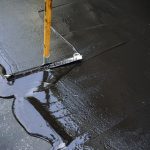Asphalt Driveway Sealers
Your asphalt driveway is exposed to a lot of hazards. This includes hazards such as the weather and common usage hazards such as normal wear and tear due to vehicles driving across it every day. No matter how safe you are, your driveway is going to be exposed to dangers. To keep your driveway in good condition and lasting for many years, you’ll want to apply a sealer. A sealer protects your driveway by blocking the damage common hazards can cause. This helps prevent issues such as chipping and cracks. There are two types of sealers to choose from: oil-based driveway sealers and water-based driveway sealers. Let’s take a look at both.
Comparing Oil and Water-Based Sealers Chemically
A water-based driveway sealer makes use of either coal-tar emulsions or asphalt emulsions to provide its protective qualities. Asphalt water-based sealants simply suspend asphalt in water before you apply it. A coal-tar mix makes use of steel industry by-products to create a protective blend that is very different from the asphalt your driveway is made of. By comparison, an oil-based driveway sealer is a petroleum-based blend that combines either a mix of asphalt rejuvenators or asphaltic chemicals in an oil solution.
Performance
Another difference between these two sealers is how they work. A water-based sealer creates a protective layer. However, this only covers the surface of your driveway. An oil-based driveway sealer penetrates your driveway’s surface, which makes it a more durable seal for the temperature changes that occur in winter. This helps prevent cracking. This means that an oil-based sealer will last longer and require fewer re-applications than a water-based sealer.
Application
When applying a sealer, the process can differ depending on what type of sealer you use. Water-based sealers often apply quite easily and have fewer side issues to concern yourself with. An oil-based sealer has a longer cure time, and you also may have to deal with a lingering odor that can take days to fully go away. Also, due to local environmental laws, there may be limitations or bans on oil-based driveway sealers, so be sure to check your local ordinances.
Disposal
Finally, there is the matter of disposing of any leftover sealant. Both water and oil-based sealants are safe to dispose of in your normal trash, provided the sealant has been allowed to dry. If your oil-based sealant is in a liquid state, it’s safer to trust its disposal to a professional.
The Best Choice
Both types of sealants offer protective properties and can keep your asphalt driveway safe. However, if your local laws allow you to use one, an oil-based driveway sealer offers longer-lasting and more durable protection.
More...
Categorised in: Paving Contractor



